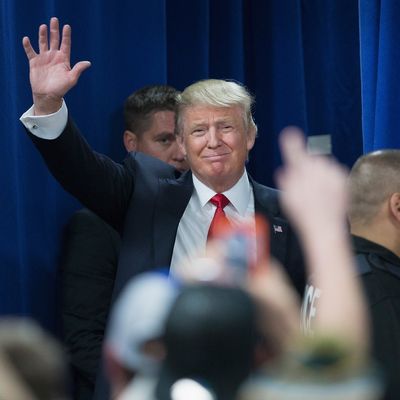
On the question of policy development, as in so many other respects, the presidential campaign of Donald J. Trump stands alone.
Anyone trying to engage the candidate and his staffers on this matter does not get a lot of encouragement. When my colleague Gabriel Sherman recently asked the candidate about his policy plans, Trump dismissively noted that he’s “got policy on my website,” as though he bought it off the shelf — which could well be true.
In February, after Trump dropped sketchy hints about his approach to replacing Obamacare in several candidate debates, inquiring minds wanted to know where he was getting his health-care ideas. His “National co-chairman and policy advisor” Sam Clovis, sometimes identified as his policy director (though rarely mentioned in media discussions), told Politico the campaign wouldn’t name names:
“We have experts around the world who help us on these various topics,” Clovis said in an interview with POLITICO. “We get very frank and honest input if we do not expose these people to the scrutiny of the press … As we get further along they might want to come out of the shadows.”
Last week, veteran New York Times health-policy reporter Robert Pear and colleague Maggie Haberman, having spoken to a variety of Republican wonks who described Trump’s health plan as an “incoherent mismash,” approached the Donald’s people again for elucidation, and again Sam Clovis was sent out to deal with it. Two months later, Clovis still declined to name any advisers.
But his remarks on policy specifics are particularly revealing and important. When asked if Mr. Trump’s plan would insure all those who have gained coverage under the health law, Clovis said: “That might be correct, but we really don’t know that. A lot of it depends on what initiatives we can get through Congress.”
That’s right, the campaign seems to figure all policy specifics are premature until Trump takes office and sits down with Republicans — and Democrats — on the Hill:
[Clovis] said that Mr. Trump would have a detailed, comprehensive plan to replace the law if Congress repealed it, and he added that any replacement “must be bipartisan …”
What makes those comments (and others like them from Trump himself talking about deal-cutting with Congress) so remarkable and explosive from a GOP front-runner is that the party has been hoping and planning to avoid deal-making or bipartisanship at all costs if it takes the White House. In the first days of a new Republican administration, the plan has been to cram absolutely everything the right wants on major domestic-policy topics — with health care high on the list — into a budget-reconciliation bill (which, because it deals money, cannot be filibustered) and whip it through Congress to be signed immediately by the president. That was, in fact, the plan that would have been implemented had Mitt Romney won in 2012. Certainly that vision does not include any sitting down and talking with congressional Democrats about what they want, no sirree — any more than congressional Republicans were interested in working with Barack Obama on his own health-reform proposal, which they opposed from long, long before Day One.
Super-lobbyist Grover Norquist famously summed up what the party and its interest groups ultimately want in a president four years ago:
“All we have to do is replace Obama … We are not auditioning for [a] fearless leader. We don’t need a president to tell us in what direction to go. We know what direction to go. We want the Ryan budget … We just need a president to sign this stuff. We don’t need someone to think it up or design it. The leadership now for the modern conservative movement for the next 20 years will be coming out of the House and the Senate. […]
Pick a Republican with enough working digits to handle a pen to become president of the United States. This is a change for Republicans: the House and Senate doing the work with the president signing bills. His job is to be captain of the team, to sign the legislation that has already been prepared.”
And this is a significant, if under-discussed, reason Republicans are worried about Trump, not just as a nominee, but as a president: Trump is telling the whole world right now that he’s going to figure out most of his policies after he’s elected. And there’s not even some policy apparatus or “kitchen cabinet” Republicans can look to or spy on to figure out where a Trump administration might go. Sam Clovis is by all accounts a pretty smart cookie, but he’s not Erasmus.
Who knows if any advisers would fill all those policy offices in the White House and the Old Executive Office Building in a Trump administration? Nothing about Donald Trump or his campaign suggests he will suddenly rely on the Republican Establishment or its many advisers for help; if he valued those kind of credentials, he would not have filled the top echelon of his campaign with people like Corey Lewandowski and Hope Hicks, who wouldn’t have made it to a second interview with a conventional GOP operation.
And thus, there is a scenario which may lead some veteran Republicans to decide that if Trump is the nominee, they are better off if he loses. After all, with the Democratic lease on the White House extended another four years, they’d almost certainly have another fine midterm election in 2018 and then manage the next presidential election properly, producing a candidate willing to carry out the well-established conservative-policy agenda that pretty much everyone other than Trump agrees upon. All their dreams would just be put on hold for four years.
But if Trump wins and proceeds to work out his policies with an invisible and perhaps imaginary group of advisers and via negotiations with Democrats, who knows what irreversible abominations might emerge, what unmendable cleavages in the GOP might open up?






























